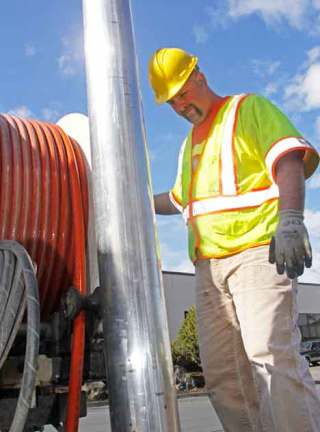Duane Oliver fights fats, oil and grease throughout Kent.
Oliver, a city sewer maintenance worker, uses a Vactor (named after the manufacturer) truck equipped with powerful water and vacuum hoses to scour the more than 200 miles of city water pipes that run under the streets.
“I work in wastewater, I keep it flowing,” Oliver tells his friends about the type of work he does.
Oliver lines up a water hose to shoot 12,000 pounds of pressure against the flow in the pipe. He then uses the vacuum hose to suck out the loosened items and unclog the pipe – collecting it all into a 1,500-gallon debris tank on the truck.
Fats, oils and grease – the stuff people put in their drains – remain the primary items that clog sewers.
“There’s lots of grease, especially around apartments,” said Bill Looney, city wastewater supervisor. “It starts to build up and eventually clogs off the line. We try to go through the whole (sewer) system every seven years, but some areas get bad after three or four years. Seven years is too long.”
That’s why Oliver’s duties also include the inspection of the more than 6,000 manholes in the city. Oliver lifts a manhole cover to find any damage.
“You pop a manhole and you can look with your eyes and see the grease real quick,” said Oliver, 35, in his second year as a sewer maintenance worker.
The city sewer crew inspected nearly 3,300 manholes in 2008. Obviously, city workers want to find problems before the problem finds them.
Sewage backed up at an East Hill apartment complex last year after the pipes became clogged. Oliver cleaned the main line 16 times in a row after the incident in order to remove the goo.
“There was a grease backup in the service line to the main line,” Looney said.
The city maintains the sewer pipes under the streets and the connection to private property lines. Property owners are responsible for the maintenance of the pipes on their land.
“We’ll get complaints from the public about a plugged line or toilets not flushing,” Oliver said. “We pop the manhole lids to make sure our system is flowing.”
Besides grease, Oliver sucks out all types of items that people put down a sink drain or flush down a toilet. Cell phones, rocks, coins, rings, keys, knives, forks, batteries, mop heads and handles are among the items he’ll flush out of the pipes. City workers even found bed sheets in a pipe near the Kent city jail.
But the sewer worker has a full life away from his pump truck.
Outside of work, Oliver is married and lives in Orting. He grew up in Kent and graduated in 1991 from Kent-Meridian High School. He enjoys working in his yard, wood shop and remodeling his 1890s-era home.
Previously Oliver worked as an operations manager at Pacific Metal Co. in Tukwila before starting part-time as a city sewer worker in 2006. He learned on the job how to clean sewers.
“At the time, I was in the process of getting married and I wanted a job with good benefits,” Oliver said of the reason for his career change.
The switch worked well for Oliver and the city.
“He always gets along with everybody,” Looney said. “He’s real thorough with his cleaning. If he has questions, he always asks before doing something. That’s a plus.”
And cleaning sewers isn’t nearly as nasty as it sounds.
“There’s a big phobia about work in a sewer,” Oliver said. “We have so much cleaning stuff. If you take the necessary precautions, there’s not much to worry about. We wear protective gear and our work is outside of the hole. Most of the dirt is down in the hole.”
The powerful vacuum hose does much of the work.
“It’ll suck the jacket off your back,” Oliver said.
But Oliver would appreciate people dumping fewer fats, oil and grease down the drain, to help keep the city sewer system clear.
“People need to treat it like they treat their heart and arteries,” Oliver said. “You want to keep your arteries clear so you will not get a heart attack. It’s the same thing.”
Talk to us
Please share your story tips by emailing editor@kentreporter.com.
To share your opinion for publication, submit a letter through our website https://www.kentreporter.com/submit-letter/. Include your name, address and daytime phone number. (We’ll only publish your name and hometown.) Please keep letters to 300 words or less.

